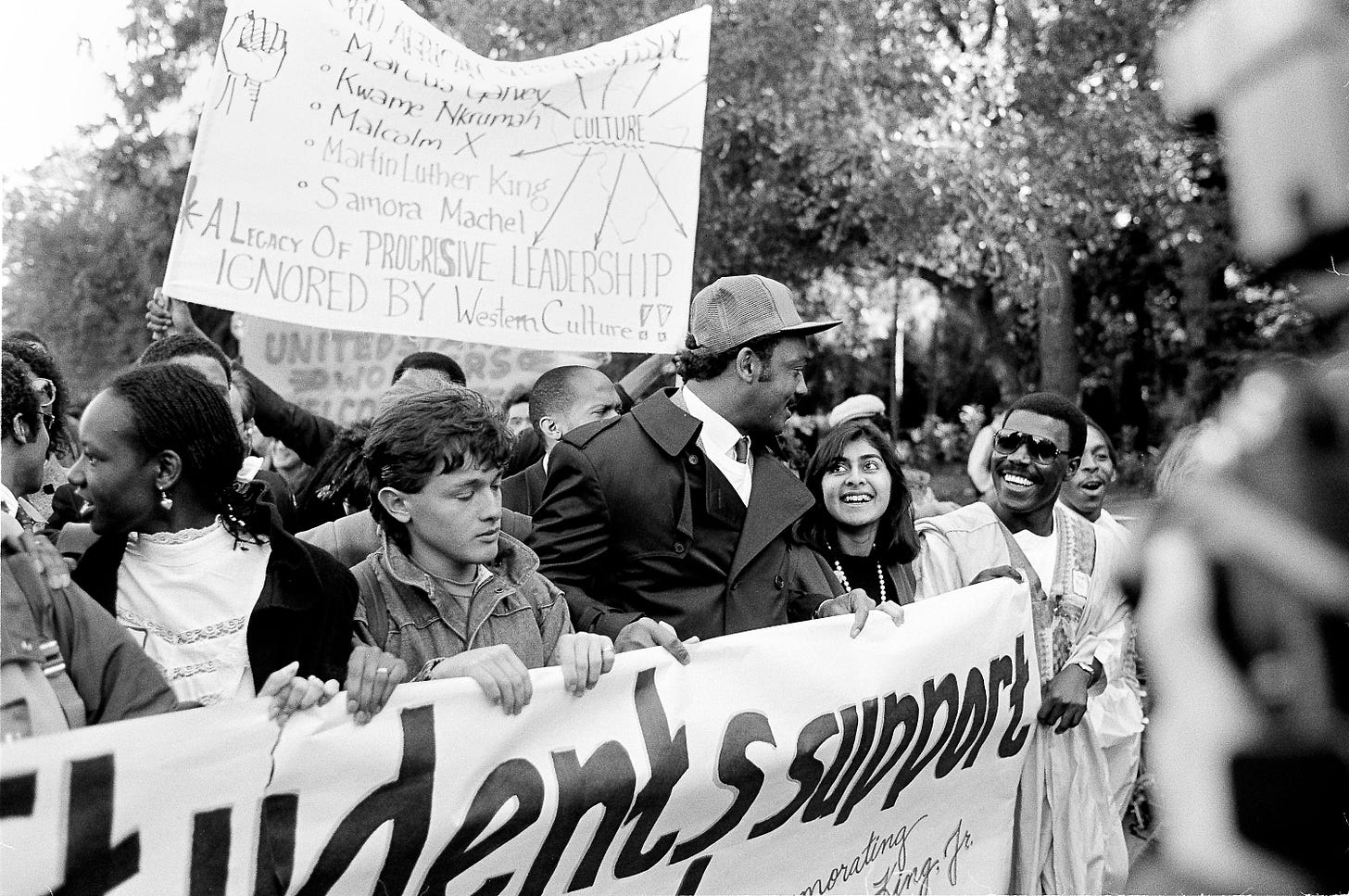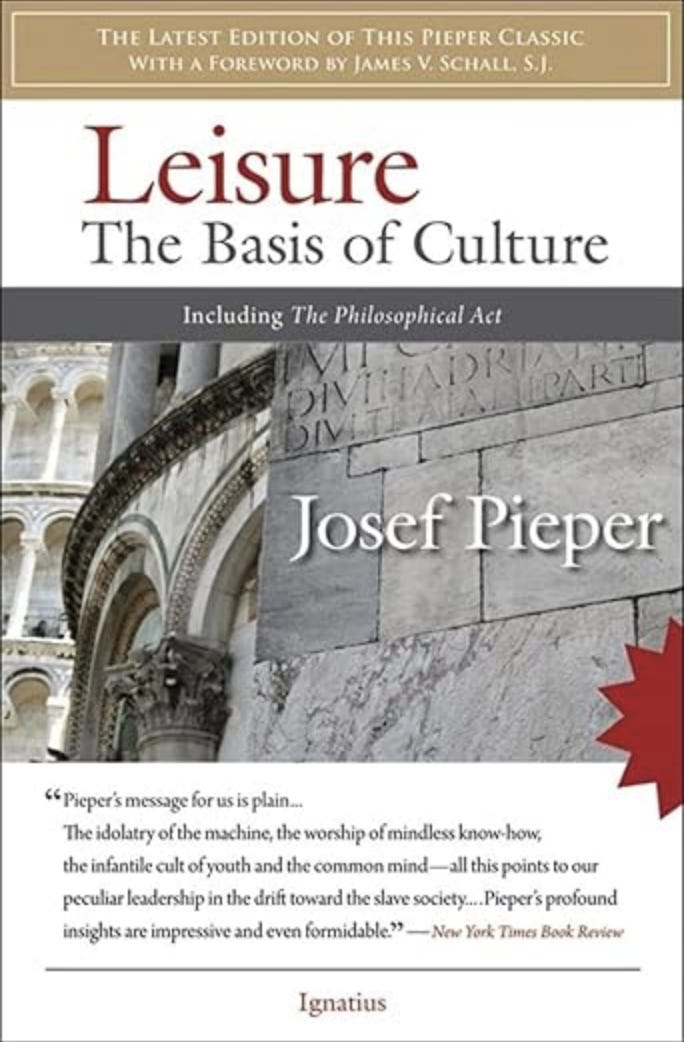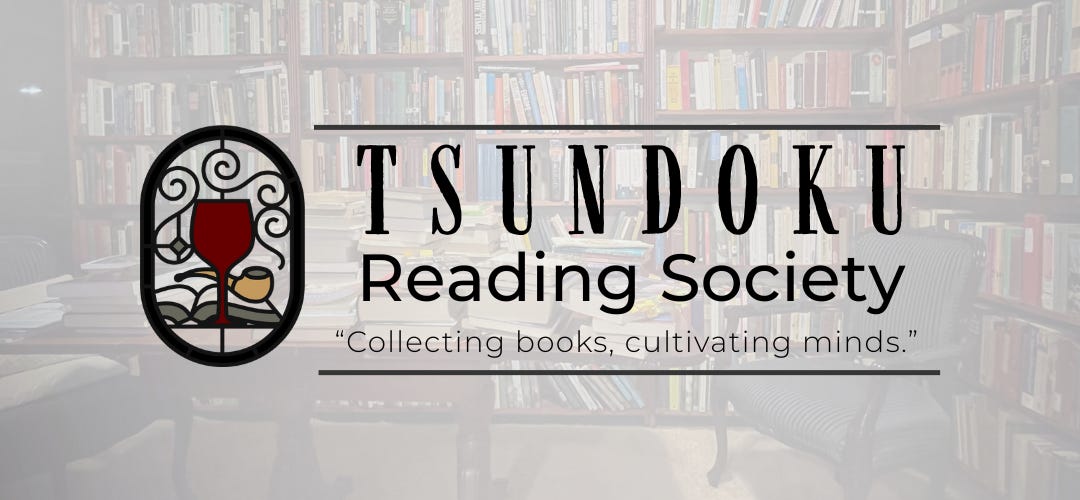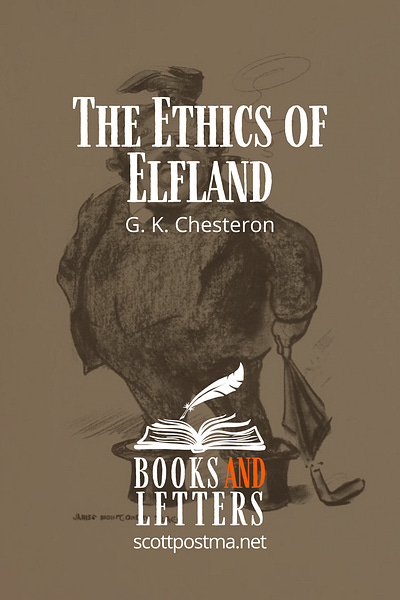Hey Hey, Ho Ho—Western Civ is How We Know!
Plus August Giveaway and Tsundoku Reading Society Meeting
“Hey hey, ho ho, Western Civ has got to go!”
That was the now-infamous chant of the 500 activists led by Jesse Jackson as they marched down Stanford University’s Palm Drive on January 15, 1987 in protest of Stanford’s introductory humanities program known as “Western Culture.”
The Stanford protest drew national attention to the university’s curriculum debate “and in 1989, Western Culture was formally replaced with the Cultures, Ideas, & Values (CIV) program that included more inclusive works on race, class, and gender.”1
The eruption of the Stanford protest quickly created a curriculum Tsunami across American universities throughout the 80s and 90s. However, the undercurrent of pressure that caused the eruption had already begun to decenter the study of the Western Tradition as early as the 1960s. The cultural revolution for displacing the intellectual works of “European white, heterosexual males” and giving “special privileges to feminists, blacks, gays, and the like,” had been building steam since the 1920s and 30s with the establishment of the Frankfurt School.2
Formally known as the Institute for Social Research, the school was established in Frankfort in 1923 in the aftermath of WWI. Prompted by the rise of the Nazi regime, the Institute closed its doors in Frankfurt in 1933 and relocated to the US (Columbia University) in 1935. Its chief theorist was Herbert Marcuse who developed a critical social theory as a polemic to German National Socialism, taught his theory at American Universities, worked for the Office of War Information, and afterward the Office of Strategic Services—the precursor to the CIA.
In the 1960s, Marcuse and one of his protégés, student activist, Rudi Dutschke, proposed the strategy of a “long march through the institutions” as a means of implementing his critical social theory, instead of what they came to believe in the aftermath of the Bolshevik/Soviet revolution were the archaic, and less effective tactics used by the early revolutionaries.3 As it is now well established, it’s no wonder that some of the new fields of “area studies” that had begun to decenter Western studies in American universities in the 60s were funded by US intelligence agencies.4
Although my saying so would certainly draw the ire of leftist intellectuals like Samuel Moyn, Kent Professor of Law and History at Yale University, who claims that accusations of “‘cultural Marxism’ is a crude slander, referring to something that does not exist…a sad diversion from framing legitimate grievances… [and[ a dangerous lure in an increasingly unhinged moment,” today, we in the US are living in the wake of Marcuse’s “long march” cultural revolution.
Thus, in light of our present moment, I champion the recovery of “Western Civs” in American academia. The Western intellectual, political, and cultural tradition is our inheritance. Those of us who live in the West, either by birth or by choice, occupy our present condition on the time continuum of history. In other words, we were born for such a time as this: we have a past full of cultural achievements and failures that we have inherited, a present that we are living in that has been conditioned by those achievements and failures, and an inheritance of wisdom or folly regarding our collective achievements and failures that we will be passing on to the next generation.
To understand and recognize our present situation and what it means is to understand and grasp the history of Western civilization that we have inherited. To this point, I appreciate how Allen Guelzo articulates the matter in his introduction to The Golden Thread,
Without understanding the struggle in the West over millennia to preserve liberty; without understanding the uniquely rich development of the Roman law tradition; without appreciating the roles that argument, hypothesis, mathematical modeling, and replicable experiment have had in Western science since the Greeks, the young are more likely to acquire the frivolous state of mind, now common, that thinks great civilizational achievements can be jettisoned without loss, once found guilty of "white supremacy." Without a grasp of the frightful history of religious warfare and the abuses of lordly power; with out understanding how unproductive and even harmful science can be when it becomes dogmatic; without understanding the centuries of violence and oppression that led to the Western embrace of religious freedom, freedom of expression, and economic freedom - without understanding all that, the young will never comprehend the reasons why it is so vital to preserve the Western tradition. It should come as no surprise that the recent generations of Westerners who believe that the West is uniquely evil have been taught nothing at all about it.
The study of Western civilization is how we know who we are. If we neglect “Western Civ” and become completely ignorant of our history, as most of the adults now sending their kids to college have, we will quickly and completely lose all sense of proportion about the reality of historical events. We will easily accept fallacies of false dichotomy, fanaticism, and catastrophism as normal and centered. And the censorship of free speech, the pulling down of monuments and institutions will be just the beginning of our pulling down a noble—albeit not without its deep faults—civilization on top of our heads.
August Giveaway
The August giveaway is a powerful classic in the conversation on culture and being a civilized person, Josef Pieper’s Leisure the Basis of Culture. In this fabulous little work, Pieper demonstrates that the Greeks and medieval Europeans understood the great value and importance of leisure. He also points out that religion can be born only in leisure—a leisure that allows time for the contemplation of the nature of God. Leisure has been, and always will be, the first foundation of any flourishing culture.
To enter the drawing, simply become a paid subscriber at $7 per month or $60 per year. You’re not only eligible for the drawing but are immediately made a member of the Tsundoku Reading Society. Plus, you gain access to the growing resource page (which includes recordings of the previous month’s book discussions, the BOOKS AND LETTERS podcast, and you get any of my print books steeply discounted (and in some cases free) whenever they become available.
The Tsundoku Reading Society
Monday, August 25th @ 4 pm PT /7 pm ET
The Tsundoku Reading Society is a community of thoughtful readers who gather online monthly to discuss the best of what has been thought and written because we thoroughly enjoy the crisp, clean sea breeze of the centuries blowing through our stifled modern minds. You don’t have to be a scholar to join the conversation. You just need a good internet connection, webcam, and mic paired with a spirit of wonder and a longing for that which is true, good, and beautiful.
If you’d like to join the Tsundoku Reading Society, simply become a paid subscriber at $7 per month or $60 per year. You’re then immediately eligible to attend the monthly discussions of the Tsundoku Reading Society, access the growing resource page (which includes recordings of the previous month’s discussion, listen to the BOOKS AND LETTERS podcast, and get print books free or steeply discounted when they become available.
Chesterton’s The Ethics of Elfland
For the month of August (I apologize for getting this out so late in the month), I’m inviting you to join me in reading Chesterton’s The Ethics of Elfland (a chapter from Orthodoxy). In this delightful essay, Chesterton advocates for our apprehension of tradition in the poetic manner only Chesterton can pull off. At one point he writes,
But there is one thing that I have never from my youth up been able to understand. I have never been able to understand where people got the idea that democracy was in some way opposed to tradition. It is obvious that tradition is only democracy extended through time. It is trusting to a consensus of common human voices rather than to some isolated or arbitrary record.
You can download the essay below and we’ll meet to discuss it on Monday, August 25th at 4:00 pm PT / 7 pm ET (the meeting is about 60-90 minutes).
Steps to Follow
Download the short story; read it; mark it up; ask questions of the text. Then, watch your inbox for login instructions to join the Zoom meeting on Monday, August 25th at 4:00 pm PT (7:00 pm ET). It’s that simple.
Got questions? email me@scottpostma.net.
https://exhibits.stanford.edu/stanford-stories/feature/1980s
https://mises.org/mises-wire/marxism-and-cultural-revolution
https://monoskop.org/images/e/e4/MARCUSE_Herbert_-_Coll._papers_6_-_Marxism_Revolution_and_Utopia.pdf, 336
https://www.thecrimson.com/article/1980/4/26/cia-funded-programs-at-columbia-pnew/






